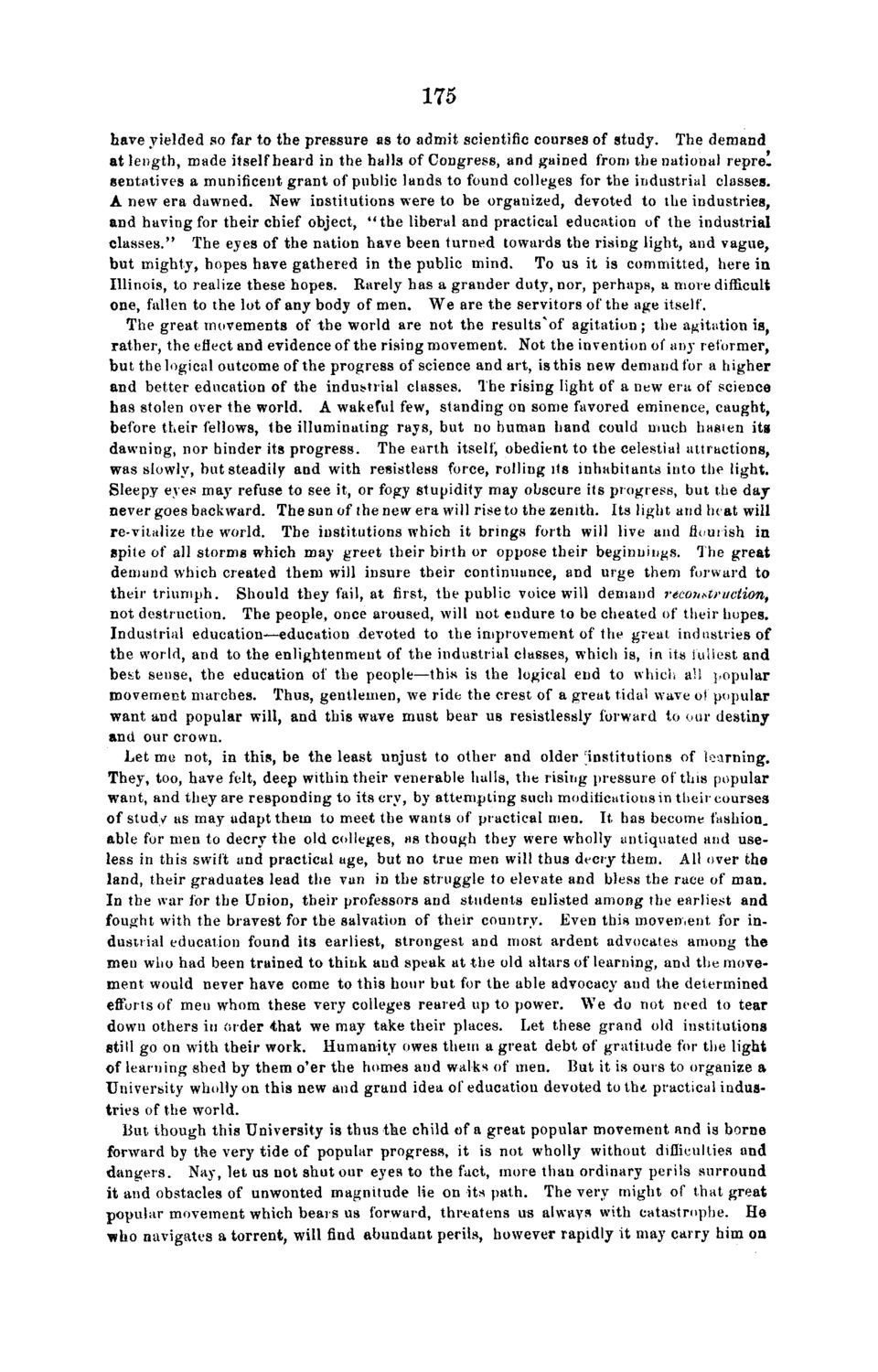| |
| |
Caption: Board of Trustees Minutes - 1868
This is a reduced-resolution page image for fast online browsing.

EXTRACTED TEXT FROM PAGE:
175 have yielded so far to the pressure as to admit scientific courses of study. The demand at length, made itself heard in the halls of Congress, and gained from the national representatives a munificeut grant of public lands to found colleges for the industrial classes. A new era dawned. New institutions were to be organized, devoted to the industries, and having for their chief object, " t h e liberal and practical education of the industrial classes." The eyes of the nation have been turned towards the rising light, and vague, but mighty, hopes have gathered in the public mind. To us it is committed, here in Illinois, to realize these hopes. Rarely has a grander duty, nor, perhaps, a move difficult one, fallen to the lot of any body of men. W e are the servitors of the age itself. The great movements of t h e world are not the results^of agitation; the agitation is, rather, the effect and evidence of the rising movement. Not the invention of any reformer, but the logical outcome of the progress of science and art, is this new demand for a higher and better education of the industrial classes. The rising light of a new era of science has stolen over the world. A wakeful few, standing on some favored eminence, caught, before their fellows, the illuminating rays, but no human hand could much hasten its dawning, nor hinder its progress. The earth itself, obedient to the celestial attractions, was slowly, but steadily and with resistless force, rolling its inhabitants into the light. Sleepy eyes may refuse to see it, or fogy stupidity may obscure its progress, but the day never goes backward. The sun of the new era will rise to the zenith. Its light and hi at will re-viialize the world. The institutions which it brings forth will live and flourish in spite of all storms which may greet their birth or oppose their beginnings. The great demand which created them will insure their continuance, and urge them forward to their triumph. Should they fail, at first, the public voice will demand reconstruction, not destruction. The people, once aroused, will not endure to be cheated of their hopes. Industrial education—education devoted to the improvement of the great industries of the world, and to the enlightenment of the industrial classes, which is, in its fullest and best sense, the education of the people—this is the logical end to which all popular movement marches. Thus, gentlemen, we ride the crest of a great tidal wave of popular want and popular will, and this wave must bear us resistlessly forward to our destiny and our crown. Let me not, in this, be the least unjust to other and older institutions of learning. They, too, have felt, deep within their venerable halls, the rising pressure of this popular want, and they are responding to its cry, by attempting such moditicutionsin their courses of study as may adapt them to meet the wants of practical men. It has become fashion, able for men to decry t h e old colleges, as though they were wholly antiquated and useless in this swift and practical age, but no true men will thus decry them. All over the land, their graduates lead the van in the struggle to elevate and bless the race of man. In the war for the Union, their professors and students enlisted among the earliest and fought with the bravest for the salvation of their country. Even this movement for industrial educatiou found its earliest, strongest and most ardent advocates among the men who had been trained to think and speak at the old altars of learning, and the movement would never have come to this hour but for the able advocacy and the determined efforts of men whom these very colleges reared up to power. We do not need to tear down others in order t h a t we may take their places. Let these grand old institutions still go on with their work. Humanity owes them a great debt of gratitude for the light of learning shed by them o'er the homes and walks of men. But it is ours to organize a University wholly on this new and grand idea of educatiou devoted t o t h t practical industries of the world. But though this University is thus the child of a great popular movement and is borne forward by the very tide of popular progress, it is not wholly without difficulties and dangers. Nay, let us not shut our eyes to the fact, more than ordinary perils surround it and obstacles of unwonted magnitude He on its path. The very might of that great popular movement which bears us forward, threatens us always with catastrophe. He ^iho navigates a torrent, will find abundant perils, however rapidly it may carry him on
| |